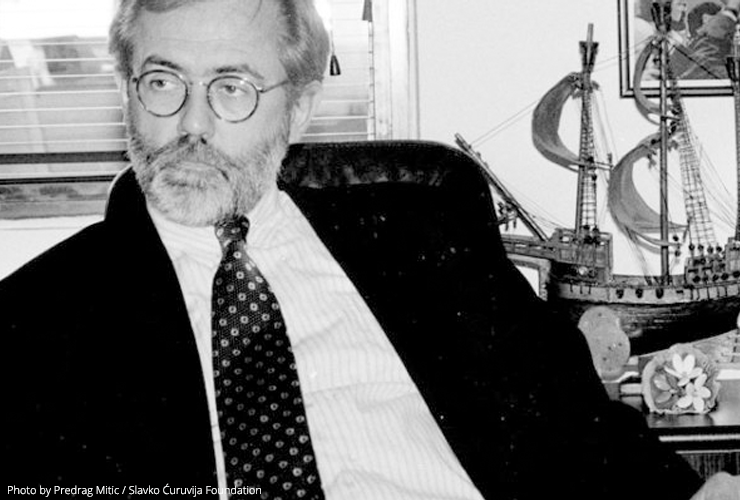In April 2019, a special court in Belgrade reached a landmark verdict in the trial for the murder of Serbian journalist Slavko Ćuruvija, an investigative reporter and owner of the Dnevni Telegraf newspaper and Evropljanin magazine.
Ćuruvija, who was a vocal critic of Yugoslav president Slobodan Milošević and was considered an opponent of the regime for advocating for NATO bombing, was shot 14 times with an automatic pistol outside his house in Belgrade in 1999.
A few days before the 20th anniversary of the murder, four former spies working for the State Security Department were convicted for the killing and each sentenced to between 20 and 30 years in prison.
The decision marked a moment of long-awaited justice for Ćuruvija’s family and an important first step forward in tackling the impunity for those responsible for the deaths of journalists in Serbia, where there are currently two other unsolved sets of cases.
Now, however, that progress risks being undone. This week the Court of Appeals in Belgrade will hold a special three-day hearing from July 7 to 9 on whether to uphold the initial verdict or overturn the conviction and order a retrial.
Such a hearing has long been sought by the defense attorneys of the accused. However, the retrial was also requested by the Deputy Prosecutor for Organized Crime, Milenko Mandić, who achieved the initial conviction.
Despite the Prosecutor’s requests largely being met and heavy sentences being handed down by the court, Mandić appears determined to attain a definitive verdict on which of the two assassins identified as being at the murder scene pulled the trigger.
Currently, the two defendants are named as “accomplices” in the initial verdict given by the Department for Organized Crime of the High Court in Belgrade, though which of them executed the murder is recorded as unknown.
Undoing progress against impunity
Ćuruvija’s family, and the Foundation set up in his name, which worked for years to achieve this verdict, fear that this progress may be undone through a potential retrial and the risks outweigh what the prosecutor is seeking.
First and foremost, it is important to stress that neither the journalist’s family, nor the Slavko Ćuruvija Foundation set up in his name, have asked for a retrial.
After 15 long and painful years waiting for an indictment and a four-year trial, they fear that the huge risks associated with a retrial outweigh the need for the conclusive answer that the Prosecutor is seeking. The initial convictions and accompanying severe sentences were considered justice served. As has already been pointed out, a second guilty verdict would simply prove that which has already been proven.
Secondly, another trial could re-examine evidence partially or in full, potentially meaning a process of sifting back through hundreds of testimonies and witness reports. This procedure could foreseeably take years, further delaying justice and prolonging closure for the family. With the first trial marked by controversial decisions, allegations of government obstruction and threats against investigators and witnesses, any new trial is likely to be equally as politicized and problematic.
Moreover, if a retrial goes ahead, two of the previously convicted defendants, Milan Radonjić and Ratko Romić, could end up serving a significant amount of their sentences under house arrest, rather than in prison.
Even more worrying, of course, is that a retrial could result in the defendants overturning the weight of evidence against them and ultimately walking free. This would be a travesty of justice not just for Ćuruvija and his family. It would also be a highly damaging defeat for the Commission for the Investigation of the Murders of Journalists, which strove for justice for Ćuruvija and has continued to push for progress in the other two cases of Serbian journalists who are suspected to have been murdered, Dada Vujasinović and Milan Pantić.
An acquittal would also undo the significant progress on impunity that the initial verdict brought, worsen the climate for media freedom and safety of journalists in Serbia, and further undermine the trust of both the public and journalists in the country’s judicial system.
Ahead of the ruling, the International Press Institute (IPI) expresses its continued support for the Slavko Ćuruvija Foundation and hopes to see solidarity with Ćuruvija’s family both in Serbia and internationally ahead of the hearing.
With the ongoing pandemic has made it difficult to monitor the trial in person, IPI will be watching the outcome closely.
We expect the original verdict to be upheld and for those who ordered, planned and committed the murder of Slavko Ćuruvija to finally be sent to prison. In upholding the initial verdict, the Chamber has an opportunity to confirm justice for the murder of a journalist for the first time in Serbia’s modern history. It should not miss it.

This statement by IPI is part of the Media Freedom Rapid Response (MFRR), a Europe-wide mechanism which tracks, monitors and responds to violations of press and media freedom in EU Member States and Candidate Countries.
